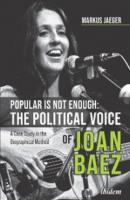Popular Is Not Enough: The Political Voice Of Joan Baez. Markus Jaeger
Чтение книги онлайн.

Читать онлайн книгу Popular Is Not Enough: The Political Voice Of Joan Baez - Markus Jaeger страница 2
Название: Popular Is Not Enough: The Political Voice Of Joan Baez
Автор: Markus Jaeger
Издательство: Автор
Жанр: Социальная психология
isbn: 9783838275567
isbn:
6.1 In the Shadow: The Comeback of Conservatism
6.2 No Matter What Their Crime Is: Joan Baez and Political Prisoners
6.3 The Normality of Otherness: Joan Baez and the Gay Liberation Movement
6.4 Life Saving Songs: Joan Baez in South East Asia After the Vietnam War
7. A Narcissistic Decade: Joan Baez in the 1980s
Introduction
7.1 The Political Meaning of Yogurt: Ramboism and Music in the 1980s
7.2 Causing Troubles: Joan Baez in Latin America
7.3 Organized Non-Violence Once More: Joan Baez in Poland
7.4 Singing for the Velvet Revolution: Joan Baez in Czechoslovakia
8. Gone from Danger: Joan Baez in the 1990s
Introduction
8.1 Still Speaking of Dreams: On Different Definitions of Energetic Change
8.2 Singing at the Frontier Lines: Joan Baez in Sarajevo
9. A Lifetime Achievement: Joan Baez in the 2000s
Introduction
9.1 War En Vogue Once More: Consequences of 9/11
9.2 Veterans and Mothers Against the War Once More: Joan Baez and Cindy Sheehan
9.3 Censorship Once More: Joan Baez Not Allowed to Sing at Walter Reed Army Medical Center
10. In Times of Nasty Men: Joan Baez in the 2010s
Introduction
10.1 In the Hall of Fame: Musical and Political Accolades
10.2 In Times of Nasty Men: Opposition to Donald Trump
Introduction
When artistic expression engages with political activism, unavoidably arising doubts tend to result in forthright lack of differentiation. The choice of artistic genre, political attitude, ideological background and specific political demands of those who are involved in offering their audiences a mixture of art and activism repeatedly leads to heated debates about the authenticity of politically active artists. This case study aims to find an answer to the question of whether a generalization about such credibility can be considered as intellectually satisfying or not. Its line of argumentation points out that lavishing care and attention on passionately upheld convictions like the alleged impracticality of popular music in relation to activist work might perhaps be not enough to adequately analyze the connection of artistic expression with political activism.
The current study explores the coalescence of Joan Baez’s work as a singer and songwriter with her endeavors as a political activist throughout the last sixty years. It aspires to illustrate an American popular singer’s significance as a political activist—for her audiences, for her opponents, as well as for those victims of politically organized violence who have profited from her work. Baez has never clearly separated her artistic work from her efforts as a political activist and in this sense has continually falsified Theodor W. Adorno’s rigid pessimistic view on the political potential of popular music. Her attainments during the most successful decade of her career—the 1960s—have been co-influential for a whole generation’s political conscience. Baez later resorted to this fame when she used her reputation to publicly speak, act and sing out against war and other kinds of organized violence from either the right or the left side of the political spectrum. More than once, she has been able to save numerous lives in the course of her activities (see, for example, Chapter 6.4).
The journalistic material on Joan Baez throughout more than half a century would fill libraries; the growth of published serious scholarly material about Baez, however, is still in its infancy. Countless scientific sources on topics like the Civil Rights Movement, the Vietnam War, political prisoners in Latin America and all the numerous other dimensions of her work positively refer to Baez and repeatedly point out the significance of her work. They are, nevertheless, not dealing with the topic of Joan Baez on a general level. One very well written and highly recommandable exception is German musicologist Jens Rosteck’s book Joan Baez. Porträt einer Unbeugsamen (in German, Osburg Verlag, 2017). The most comprehensive bibliographical source of information to start any form of research on Baez, however, is Charles Fuss’ highly recommendable informative bio-bibliography of 1996 (see also Fuss, 1996).
The number of sources specifically dealing with Baez’s work, on the other hand, is limited: Mexican scholar Avital Bloch, for instance, has added comprehensive essay contributions about the different points of view from which Baez’s work can best be analyzed in the wide field of Peace Studies. In the book Impossible to Hold: Women and Culture in the 1960’s, her essay “Joan Baez: A Singer and Activist” analyzes the complex ways her rise to fame answered difficulties resulting from the cultural and political generation gap between the 1950s and the 1960s (see also Bloch, 2005). Her contribution “Peace Activism and Paradox of Gender Values: Joan Baez and Vietnam” to the anthology American Studies and Peace, which was published after the 25th conference organized by the Austrian Association of American Studies in Salzburg in 1999, is an essay about Baez’s image as a woman and the multifaceted significance of a changing perception of femininity for Baez’s development as a peace activist (see also Bloch, 2001).
СКАЧАТЬ